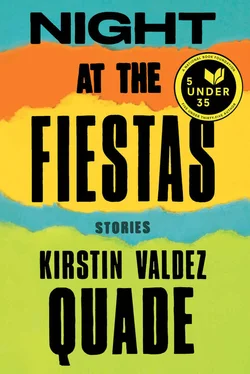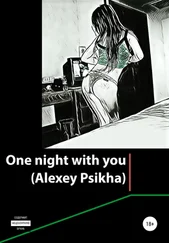Nemecia put her hand on my shoulder. “It’s about the blessed sacrament, Maria. It’s not about you.” She spoke gently. “Besides, you’ll still be leading it. I’ll just be there with you. To help.”
“Hijita, listen—”
“I don’t want your help,” I said. I was as dark and savage as an animal.
“Maria—”
Nemecia shook her head and smiled sadly. “That’s why I am here,” she said. “I lived so I could help you.” Her face was calm, and a kind of holiness settled into it.
Hate flooded me. “I wish you hadn’t,” I said. “I wish you hadn’t lived. This isn’t your home. You’re a killer.” I turned to my mother. My words were choked and furious. “She’s trying to kill us all. Don’t you know? Everyone around her ends up dead. Why don’t you ever punish her?”
My mother paled, and suddenly I was afraid. Nemecia was still for a moment, and then her face clenched and she ran into the house.
AFTER THAT, EVERYTHING HAPPENED very quickly. My mother didn’t shout, didn’t say a word. She came into my room carrying the carpetbag she used when she had to stay at the home of a sick relative. I made my face more sullen than I felt. Her silence was frightening. She opened my bureau and began to pack things into the bag: three dresses, all my drawers and undershirts. She put my Sunday shoes in too, my hairbrush, the book that lay beside my bed, enough things for a very long absence.
My father came in and sat beside me on the bed. He was in his work clothes, pants dusty from the field.
“You’re just going to stay with Paulita for a while,” he said.
I knew what I’d said was terrible, but I never guessed that they would get rid of me. I didn’t cry, though, not even when my mother folded up the small quilt that had been mine since I was born and set it into the top of the carpetbag. She buckled it all shut.
My mother’s head was bent over the bag, and for a moment I thought I’d made her cry, but when I ventured to look at her face, I couldn’t tell.
“It won’t be long,” my father said. “It’s just to Paulita’s. So close it’s almost the same house.” He examined his hands for a long time, and I too looked at the crescents of soil under his nails. “Your cousin has had a hard life,” he said finally. “You have to understand.”
“Come on, Maria,” my mother said gently.
Nemecia was sitting in the parlor, her hands folded and still on her lap. I wished she would stick out her tongue or glare, but she only watched me pass. My mother held open the door and then closed it behind us. She took my hand, and we walked together down the street to Paulita’s house with its garden of dusty hollyhocks.
My mother knocked on the door and then went in, telling me to run along to the kitchen. I heard her whispering. Paulita came in for a moment to pour me milk and set out some cookies, and then she left again.
I didn’t eat. I tried to listen, but couldn’t make out any words. I heard Paulita click her tongue, the way she clicked it when someone had behaved shamefully, like when it was discovered that Charlie Padilla had been stealing from his grandmother.
My mother came into the kitchen. She patted my wrist. “It’s not for long, Maria.” She kissed the top of my head.
I heard Paulita’s front door shut, heard her slow steps come toward the kitchen. She sat opposite me and took a cookie.
“It’s good you came for a visit. I never see enough of you.”
The next day I didn’t go to Mass. I said I was sick, and Paulita touched my forehead but didn’t contradict me. I stayed in bed, my eyes closed and dry. I could hear the bells and the intonations as the town passed outside the house. Antonia led the procession, and Nemecia walked with the adults; I know this because I asked Paulita days later. I wondered if Nemecia had chosen not to lead or if she had not been allowed, but I couldn’t bring myself to ask.
I stayed with Paulita for three months. She spoiled me, fed me sweets, kept me up late with her. Each night she put her feet on the arm of the couch to stop the swelling, balanced her jigger of whiskey on her stomach, and stroked the stiff gray hair on her chin while she told stories: about Cuipas when she was a girl, about the time she snuck out to the fiestas after she was supposed to be asleep. I loved Paulita and enjoyed her attention, but my anger at my parents simmered even when I was laughing.
My mother stopped by, tried to talk to me, but in her presence the easy atmosphere of Paulita’s house became stale. Over and over she urged me to visit her in the store, and I did once, but I was silent, wanting so much to be drawn out, disdaining her attempts.
“Hijita,” she said, pushing candy at me across the counter.
I stood stiff in her embrace and left the candy. My mother had sent me away, and my father had done nothing to stop her. They’d picked Nemecia, picked Nemecia over their real daughter.
Nemecia and I saw each other at school, but we didn’t speak. The teachers seemed aware of the changes in our household and kept us apart. People were kind to me during this time, a strange, pitying kindness. I thought they knew how angry I was, knew there was no hope left for me. I too would be kind, I thought, if I met myself on the road.
The family gathered on Sundays, as always, at my mother’s house for dinner. That was how I had begun to think of it during those months: my mother’s house. My mother hugged me, and my father kissed me, and I sat in my old place, but at the end of dinner, I always left with Paulita. Nemecia seemed more at home than ever. She laughed and told stories and swallowed bite after neat bite. She seemed to have grown older, more graceful. She neither spoke to nor looked at me. Everyone talked and laughed, and it seemed only I remembered that we were eating with a murderer.
“Nemecia looks well,” Paulita said one night as we walked home.
I didn’t answer, and she didn’t speak again until she had shut the door behind us.
“One day you’ll be friends again, Maria. You two are sisters.” Her hand trembled as she lit the lamp.
I couldn’t stand it anymore. “No,” I said. “We won’t. We’ll never be friends. We aren’t sisters. She’s the killer, and I’m the one who was sent away. Do you even know who killed your brother?” I demanded. “Nemecia. And she tried to kill her own mother too. Why doesn’t anyone know this?”
“Sit down,” Paulita said to me sternly. She’d never spoken to me in this tone. “First of all, you were not sent away. You could shout to your mother from this house. And, my God, Nemecia is not a killer. I don’t know where you picked up such lies.”
Paulita lowered herself into a chair. When she spoke again, her voice was even, her old eyes pale brown and watery. “Your grandfather decided he would give your mother and Benigna each fifty acres.” Paulita put her hand to her forehead and exhaled slowly. “My God. So your grandfather stopped by one morning to see Benigna about the deed. He was still on the road, he hadn’t even made it to the door, when he heard the shouting. Benigna’s cries were that loud. Her husband was beating her.” Paulita paused. She pressed the pads of her fingers against the table.
I thought of the sound of fist on flesh. I could almost hear it. The flame of the lamp wavered and the light wobbled along the wide planks of Paulita’s kitchen floor.
“This wasn’t the first time it had happened, just the first time your grandfather walked in on it. So he pushed open the door, angry, ready to kill the man. There was a fight, but Benigna’s husband was drunk and your grandfather wasn’t young anymore. Benigna’s husband must have been closer to the stove and to the iron poker. When they were discovered—” Paulita’s voice remained flat. “When they were discovered, your grandfather was already dead. Benigna was unconscious on the floor. And they found Nemecia behind the wood box. She’d seen the whole thing. She was five.”
Читать дальше












